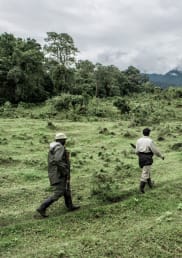Integrating gender and security in climate adaptation: Principles for success
This guidance note offers six principles to help donors and practitioners globally to better integrate conflict and gender into climate adaptation programming.
Men and women, and boys and girls, experience climate change, peace and security in different ways. Deeply rooted gender norms, expectations and roles lead to different impacts and shape different coping and adaptation mechanisms. This affects different genders, generations, ethnicities, religions, abilities or sexual orientations. Ignoring these dynamics risks creating new vulnerabilities and reinforcing existing inequalities.
Sustainable and context-specific solutions to the security threats caused by climate stress must be grounded in these dynamics and take into account the unique needs and insights of people in their varied social identities.
Listening to diverse stakeholders, and tailoring initiatives to their lived experiences of climate change, insecurity and conflict, is critical to ensuring that decision-making and strategy development around climate adaptation is sustainable.
This guidance note builds on a series of engagements and research conducted in Myanmar, Mali, Lebanon and Jordan into the current state of climate adaptation programmes and policies, and the extent to which they integrate gender and security. It offers six principles and responses to help donors and practitioners globally to better integrate conflict and gender into climate adaptation programming.
Webinar
During London Climate Action Week 2021, we hosted a roundtable event with Chatham House to discuss how conflict and gender analyses can support successful adaptation to the climate crisis in fragile and conflict-affected states.
Peace Research Partnership
This report was produced as part of the Peace Research Partnership (PRP), a process of participatory research with partners and communities in conflict-affected areas around the world. The aim of PRP was to generate and share knowledge about how international actors, like INGOs and donors, can best support peaceful and inclusive change in conflict contexts. The research partnership was funded by the UK government. However, the views expressed do not necessarily reflect the UK government’s official policies.






